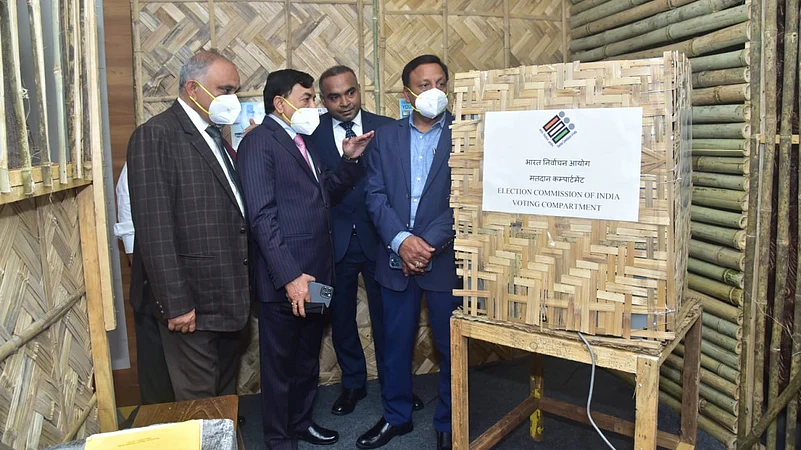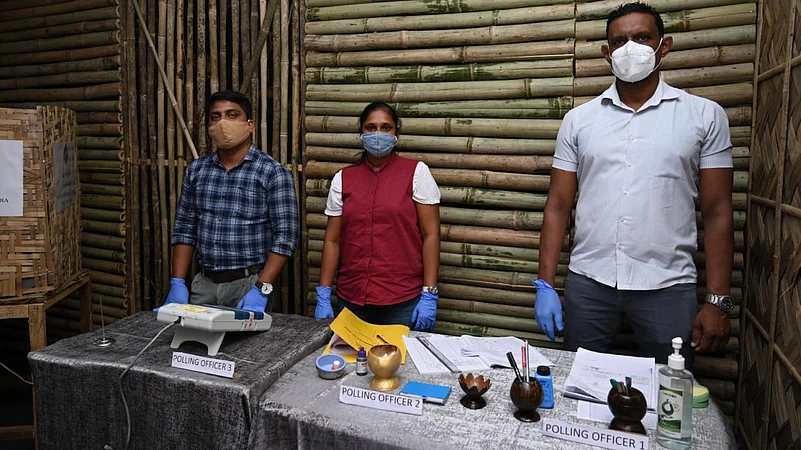Flags of political parties fluttering atop buildings, on bus stops, traffic signals, hand carts, shop windows and every other structure is the first association with electioneering. Then come the flex banners with photographs of leaders of every stature jostling for significant space on its dimensions. Every election throws up piles of polluting waste that leaves behind an ineradicable residue. Plastic dominates all campaigns and the mounting piles cause large scale damage to the environment. However, in Goa, the Office of the Chief Electoral Officer (CEO) has decided that the state will lead the way by conducting a no-plastic 2022 Assembly polls. This will be a first for any state in the country.
Every material used in the polling station, including the booth itself, will be biodegradable and locally sourced. This “model” Goa polls is an attempt by multiple departments of the state government and the CEO to showcase to the nation that elections can be “green and clean”. This no plastic election will be conducted completely with the use of natural materials sourced locally from various parts of Goa. This will help promote local handicrafts, reduce carbon footprint and make the 2022 Assembly elections of Goa stand apart from the other states is the primary aim of this green election, clean election initiative. This is being implemented by the CEO, Goa State Handicrafts Cooperation and the Goa State Biodiversity Board.
Voters will exercise their franchise in polling booths made of biodegradable materials. Coconut shells, palm fronds, bamboo, shells, conch shells are being used to make elections booths, photo booths, baskets, pens, trays, bins etc., to translate the ambitious plan of the CEO into a reality and make the 2022 Assembly polls a green, clean and an environment friendly one. About 500 local artisans from the scenic Sattari and Ponda have been contracted by the CEO to deliver its vision. These artisans are already at work and the products will be delivered to a staggered timeline so that the work is completed well in time for the polls. The Booth Level Officers (BLO) are coordinating with the artisans to ensure that deadlines are met.

Speaking to Outlook, the chief electoral officer Kunal said that this idea was an extension of the Goan’s respect and love for nature. “Nature plays an important role in the life of the people of Goa. We were keen on reducing the carbon footprint during the elections. In October last year we decided to hold an eco-friendly, green and clean election. After working and reworking on various ideas, in December last year we realized it is very doable,” said Kunal. As a former secretary of the Environment Ministry in the state, he is keen on inculcating environment consciousness and thought the best way to begin is Elections 2022.
A month ago, an ecofriendly selfie competition was held by the CEO, wherein people had to send their photos in an environment friendly way. Those selected have been displayed in selfie booths in many parts of Goa. The CEO plans to set up 50 ecofriendly selfie booths across the state, said Kunal. The CEO has been providing financial assistance for the setting up of the selfie stands. According to him, the lack of physical campaigning has made their ecofriendly venture a success. “Goa is a compact society where door-to-door campaigning is very popular. Here modernity and tradition co-exist. Fortunately, we have a good team who connect, give ideas and implement,” said Kunal.
Once it was decided to go ahead with the green polls’ initiative, the Goa State Handicrafts Cooperation got in touch with some artisans from Sattari. Artisan Suryakant Gaonkar from Bhuipal village in Sattari is a Ganesha idol maker. In fact, Sattari is known for its clay-based Ganesha idols. Gaonkar has been using local produce to make environment friendly décor which is popular with the rest of Goa. In 2020, Gaonkar was awarded the Goa Biodiversity Award for his work using biodegradable materials for colours and décor. He was partnered by Navso Parwar and Shailesh Mangesh Chari, who too are from Sattari. The trio created a model of the polling booth using environment friendly materials. “We used bamboo and coconut leaves excessively. The paddy hay was also woven into the bamboo and coconut fronds. We wove them together to make sturdy walls and roof,” said Gaonkar to Outlook.
The sturdiness and other aspects of this ready booth were thoroughly examined by the CEO team. Realizing that an idea had germinated into reality, the CEO gave the artisans to go ahead to manufacture booths for all the 1700 polling stations across the state. Women’s self-help groups, youth groups, local mandals and the artisans of Sattari and Ponda joined hands to make history. Nearly every artisan family in Sattari has in some way contributed to the realization of the idea, said Gaonkar.

Beautifully crafted polling stations, decorated with natural materials will greet voters who come to cast their vote. Voters who enter the polling booth will get a glimpse of an array of water bottles kept in bamboo baskets for any emergencies that may arise. The all-important hand sanitizers, masks and gloves will be kept in coconut shells and bamboo trays. This is not all. There will be bamboo bins to throw used gloves and masks, these too will be kept inside the ecofriendly polling station.
This “green booth experiment” will give a fillip to the sagging fortunes of the handicrafts industry, which has been severely hit by the pandemic. This will also generate an awareness about Goa’s traditional craftsmanship, which has not been adequately showcased, said Kunal.


























